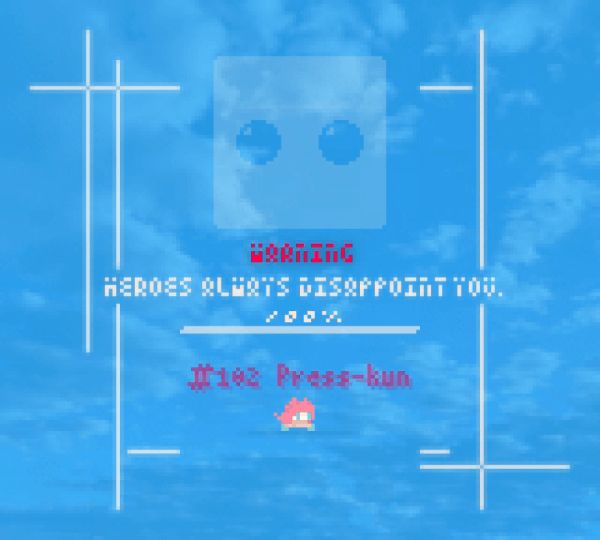🌟 Developer Spotlight: nizakashii
2024年 4月 06日

The classic shooting game format, as introduced by Space Invaders and bolstered by a great many successors from the early '80s and far beyond, was largely borne of sheer practicality: in the days of primitive graphics and modest CPUs, shooting a simple bullet at a simple object was not only one of the more efficient actions a video game could simulate but one of only a few concepts the hardware could accommodate in any way whatsoever, so their existence and subsequent popularity seem almost axiomatic.
ROMGADR, mini-game shmups
As the years went on and the capabilities of video game hardware continued to expand, so too did the role of shooting games among the broader pantheon of video game genres. Those pragmatic qualities that once made them an essential element of the commercial landscape now represented a format that challenged game creators to realize more with less, and presented a particular opportunity for ambitious programmers to level the playing field against competing games that might have been afforded higher budgets or cutting-edge hardware—a skilled programmer might not be able to draw the coolest lookin’ thing, but they might be able to make it move in a cool way, or put eight hundred of 'em on screen at once, or simply exercise a greater degree of authorship over the moment-to-moment experience that could not be afforded to games underpinned by painstaking animations or flashy graphical conceits that necessitated larger teams, larger budgets and more specialized, atomized contributions from each team member. The shooting game genre became one of cognoscenti whose players came to recognize and admire the nuance behind seemingly basic games, and whose most celebrated creators were intimately attuned to their creations to the last detail.
HAKOPALACE, battle with mid-bosses
Nowadays, those notions of flexing one’s programming chops or wringing the maximum amount of expression from a very constrained hardware set are largely forgotten—the commercial audience for traditional shooting games has dwindled to nothing, for starters, so these games aren’t “competing” against anything, but aside from that, contemporary hardware can handle pretty much anything one might throw at it, given some straightforward and rather routine optimization. Moreover, so much of the functionality that might’ve required specialized technical expertise has become much more accessible via common engines and middleware, thereby broadening the entryway for less technically adept creators to try their hand at the genre. Even so, the tenets of shooting game design molded under those conditions have persisted to this day, and the indie developers that consciously commit to making traditional shooting games not only continue to explore and codify those traditions but are also finding new ways to exercise that same degree of auteurship beyond the technical.
MagicVigilante, bullet-hell shooter
One such indie developer is nizakashii, a developer whose first game. Daydreamer, appeared on itch.io and Freem with little fanfare in early 2021. Daydreamer’s lo-fi aesthetic caught my eye, and the game’s unique “death game” structure, which allows the player to challenge virtually all of the very gimmicky, minigame-esque bosses in any order, struck me as particularly suited to newer players; it was a little rough around the edges, but I had high hopes for their next game…
…and then, maybe six weeks later, they released another game: snail_world, a free-scrolling horizontal game in the vein of Sega’s Fantasy Zone, that offered a similarly confident aesthetic with a few little tweaks that demonstrated a little more thoughtfulness in terms of player visibility. Wow, I thought, they must have had that game in the tuck. I wonder what they might make next?
snail_world, shmup like a fantasy zone
nizakashii released five additional games by the end of 2021, which included the ESPGaluda-ish danmaku game Klorets and the mouse-and-keyboard platformer RETICLE_STAR, among various puzzle games and a Game & Watch spoof, and as someone whose well-worn expectations of doujin shooting game devs was to expect maybe one website update a year if you’re lucky, I couldn’t believe the pace with which they were releasing—and possibly even making—these games, not to mention the incremental improvements being made with each genre title.
RETICLE_STAR, minimal rough platformer
2022 saw them release six more games, the fixed-screen arena shooter NEKOTOSAKANA, the arena FPS CielClou and the three-minute line-making grid puzzler PUTTIUM among them, and as I played through each game, I came to realize the power of being presented with game after game, beyond simply observing nizakashii’s increasing proficiency as a developer: I was starting to get a true sense of their personality, in a way that I don’t think would be possible if they’d released games at a slower pace, or been forced to labour over a single game for an extended period of time. I don’t just mean I was picking up on all the old genre shibboleths, either—like, sure, I clapped when I saw the reference to Akai Katana or Radiant Silvergun or whatever, but the more resonant through-line came from noticing an increasing use of what looked like digitized graphics taken from their real life, and the benign fatalism that occasionally crept into their incidental text. I tend to think of arcade-style shooting games as being akin to some grand tapestry weaved in ode to a monumental battle… by comparison, these games strike me more as concrete handprints, memorializing a moment in time for nobody in particular.
NEKOTOSAKANA, top-down shmup
They released four games in 2023, and I have to imagine they have more cooking at this very moment, too. Part of me wonders whether they might be gearing up for something bigger, or a transition into paid games—or, conversely, that they’re deliberately trying to avoid any pressure to scope up—but whatever the case, I certainly don’t believe their current approach requires any recalibration. Not every work has to double as a grad thesis; a lot of times, a status update is just fine.

